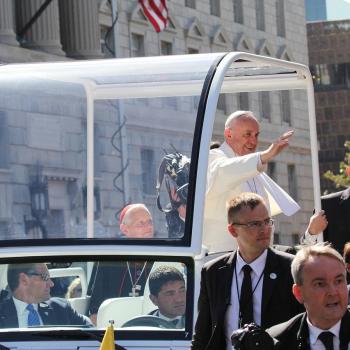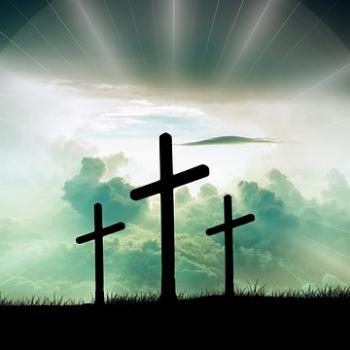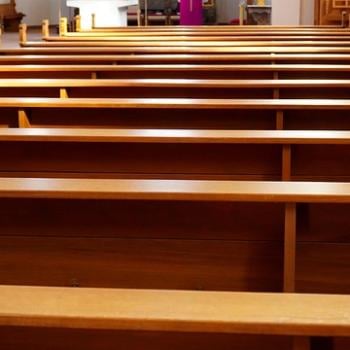THE QUESTION:
Should national flags be displayed, or patriotic songs be sung, during Christian worship?
THE RELIGION GUY’S ANSWER:
This issue comes to mind amid the seasonal fuss over professional football players’ political protests during the pregame National Anthem. Not to mention veterans organizations’ indignation when non-veteran Donald Trump temporarily refused to lower the White House flag to half-staff in honor of the late prisoner of war John McCain.
Considering the emotions in such secular situations, it’s unsurprising that the perennial religious questions above continually provoke lively comment on the Internet and elsewhere. Some weeks ago, a friend in The Religion Guy’s own congregation (Christian Reformed) asked why we don’t display the American flag up front like other churches do. I didn’t know but that brought to mind other situations.
The Guy’s daughter was flummoxed by a Southern Baptist service in North Carolina on a July 4th weekend. It began with a military color guard marching forth with the American flag, whence the worshipers recited the Pledge of Allegiance. She asked the old man, isn’t Christian worship about a different allegiance?
The Guy is familiar with an evangelical summer camp that parades the U.S. flag along with other nations’ flags at worship to symbolize foreign missions. The ceremony gives Old Glory prominence above the other flags, which disregards protocol in federal law and military regulations requiring equal respect.
The Guy has visited innumerable churches that give the U.S. flag the place of ceremonial honor to the pastor’s right with the Christian flag (a 1907 American invention) relegated to the left. By military tradition, when the Christian flag is on display it stands to the right as the only situation where the American flag is placed at platform left.
As for music, The Guy gladly attends an area Memorial Day eve service honoring veterans and the war dead that concludes with “God Bless America.” And our town’s interfaith Martin Luther King Day service always includes the bittersweet but patriotic “Lift Every Voice and Sing,” considered America’s “Black National Anthem” and found in many Christian hymnals.
Small groups like the Mennonites and Quakers are patriotic but refuse to bear arms and avoid the flag in church and elsewhere due to its association with warfare. Jehovah’s Witnesses not only shun the flag and military service but famously refuse to recite the Pledge of Allegiance. What do major denominations teach?
The U.S. Catholic bishops state that “surprisingly to many,” worldwide liturgical regulations and canon law say nothing about flag displays, which became common in U.S. parishes during World War Two. So policy is up to the area bishop who often will delegate decisions to each parish pastor. However, the bishops’ liturgy committee encourages priests to keep flags out of the sanctuary and reserve it for religious symbols, suggesting that a national flag be placed in the vestibule.
The large Evangelical Lutheran Church in America is equally wary. Its worship agency reports this is one of its “most frequently asked questions.” Though each congregation decides, the agency says the New Testament (“there is neither Jew nor Greek . . . for you are all one in Christ Jesus” — Galatians 3:27-28) means “the most appropriate visual symbols displayed in worship spaces convey this unity in Christ” rather than uplifting one nation.
The Lutherans’ “Principles for Worship” says national flags may be “divisive” or imply “a particular national identity is synonymous with the Christian way.” Therefore, flags should not be placed permanently in the sanctuary, though they may be brought in for “certain national occasions.” Otherwise they belong elsewhere in the church building.
Southern Baptist Convention spokesman Russell Moore has expressed mixed feelings. “Natural affection” for nation and flag is “rooted in something good and right,” he believes, if this is a reminder that God placed us here, that we build on ancestors’ sacrifices, and that Christian citizens “have a responsibility to our neighbors of all faiths for the generations to come.” But “the flag can be a perilous thing in an American evangelical subculture so infected with civil religion.”
There’s far less discussion of music. Catholic Deacon Greg Kandra, for one, noted in a July patheos.com article that his parish concludes worship on Independence Day weekend with rousing verses of both “America the Beautiful” and “God Bless America” (but not the National Anthem). The songs are add-ons following the Mass proper just before the benediction. This reflects “popular taste,” he remarked, and if songs on national holidays disappeared, parishioners “would be in an uproar.” He hopes the music evokes gratitude for America’s gift of religious freedom.
Though this “Q & A” focuses on Christianity, what about Judaism? Last July 4, a Times of Israel article said U.S. and Canadian Jews are often surprised that synagogues overseas rarely display national flags alongside the religious symbols in sanctuaries. Historian Gary Zola writes that U.S. flag displays have been “almost ubiquitous” since World War Two, usually placed on the bimah (ritual stage), and since 1948 often alongside Israel’s national flag.
An Orthodox authority, Rabbi Moshe Feinstein, ruled in 1957 that no national flags belong in sanctuaries. But he said their removal is not mandatory because Jewish law has no explicit prohibition.
On Jews and music, there’s this: A New York C.E.O. who published music by The Guy’s father was a Jewish immigrant so grateful to America that he specified his funeral was simply a performance of “The Star Spangled Banner” with not one word spoken.
Religious debates aside, a note of personal privilege from a former player in the University of Michigan Marching Band and the 282nd and 287th U.S. Army Bands, which together represent 368 years of musical history. Please, replace that soupy and incorrect “Star Spangled Banner” recording used at Olympics award ceremonies. And please, no more pop stars self-indulgently mangling the Anthem before ball games.












